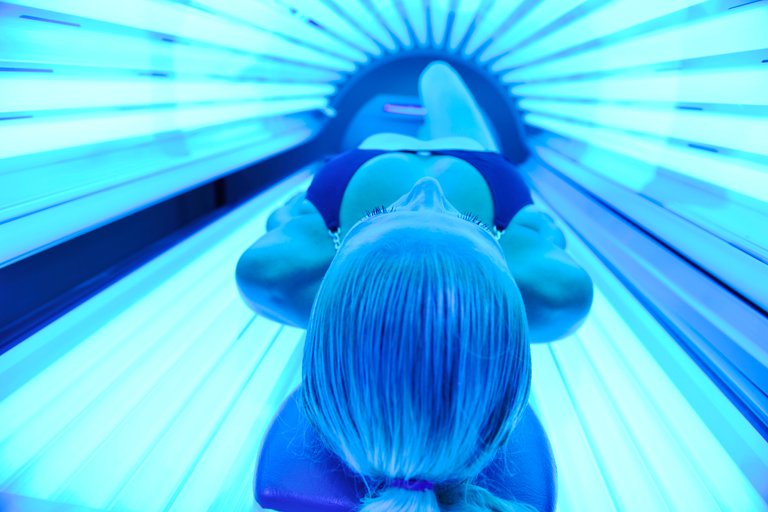It's summertime (where I live at least), which is that time of year, where you go out and bask in the Sun with minimal amounts of clothing on, to achieve a tan - no questions asked. We know the Sun is what gives you a tan, but technically speaking, how does it do this?

The Science of Tanning
The Sun is great. It gives us daylight, feeds our plants, causes the production of Vitamin D in our bodies and of course, gives us a nice tan. What more could you ask for? At this point you may think our Sun is perfect - but it does have its cons. The Sun can cause aging, give sunburns and can even cause certain types of skin cancer. In a way, it is our best and worst enemy, at the same time!
More about the Sun
The Sun emits many different wavelengths of light. The radiation reaching Earth is roughly 43% visible light – the white light we see, 53% infrared and 4% ultraviolet light. When light has different wavelengths, it has different energies. Generally, the shorter the wavelength, the higher the energy of that light. Ultraviolet is the shortest out of these 3 types the Sun emits – meaning it has the highest energy. In fact, this energy is high enough to penetrate your skin and cause DNA damage.
Ultraviolet Light
Ultraviolet, or UV for short, can be split up into 3 different groups; UVA, UVB and UVC. The Earth’s atmosphere filters out these types of UV differently, as follows:
- UVA is not blocked by the atmosphere at all so can be damaging throughout any time of the day.
- UVB is partially blocked by the atmosphere so some of it gets to the ground. This can be blocked by sunscreen or glass.
- UVC is almost completely stopped by the Earth’s atmosphere so does almost no damage to people.
In conclusion, the only two that matter when it comes to being on the surface of the Earth are UVA and UVB.

Figure 1: Picture showing sunbed which uses UV to mimic the effect of the Sun to induce a tan in an individual's skin
The Human Skin
The human skin is incredible and does a lot to protect our inside organs from external damage. In fact, it has evolved to protect us from the Sun’s violent radiation using a protein called melanin. This protein is present in all skin cells and absorbs both UVA and UVB. Having a lot of this protein makes you look darker. Our genes dictate how much melanin we have naturally but if needed, the skin can produce more of it.
The Skin’s response to UV
When UVB hits the skin, it penetrates the upper layer of skin meaning it can still cause direct DNA damage to cells underneath. To counteract this the skin then produces more melanin to absorb more of this harmful radiation. It is UVB that causes long lasting tans due to increased production of melanin - but what about UVA?
UVA is higher energy than UVB and penetrates the skin even deeper, which is bad news. BUT, thankfully it does not cause direct DNA damage. Instead it causes free radicals to form in your cells which in turn, may cause DNA damage.

What does DNA damage do to the body?
Unfortunately, DNA damage can lead to cancer, meaning what may seem like a nice day in the Sun, could turn out to be much worse than that. Don’t fret though, our skin has many repair mechanisms in place which are incredibly good at repairing our DNA – hopefully fixing any damage caused by the Sun. Cancer is only caused if this damage slips past all these safe guards which is unlikely but still possible!
Therefore, it is incredibly important you wear your sunscreen as directed on the box. Sunscreens tend to only protect you against just UVB, but some can also stop UVA… try find these types and use them. It is better safe than sorry!
Have a nice Summer and if you have any questions, leave them below. Until next time, take care.
~ Mystifact
Relevant articles:
How do Microwaves heat up food?
Freezing Humans: Can we freeze time?
What is Cancer? How does it kill?
Previous articles:
Wonders of Quantum Physics: "What is Matter?" - Episode 2
What makes a Rainbow?
Why do we Dream?
very nice explanation as always . loved it !
Thank you! I always try and explain things that everyone can understand :)
@mystifact
Good Job!
Keep posting!
Thanks
I definitely will! Thanks for your comment.
See your post mentioned here
Thanks for that :)
very nice friends
Thank you! :)